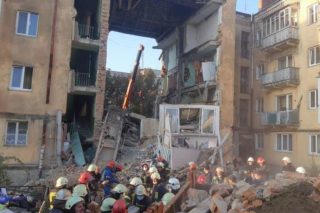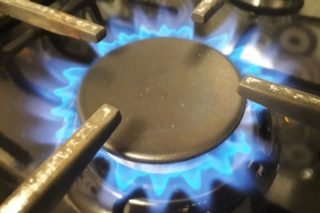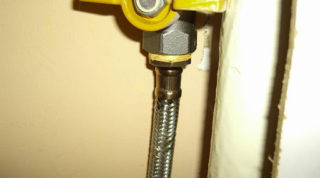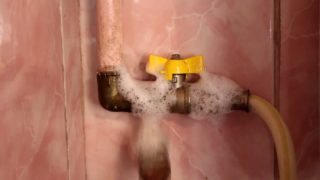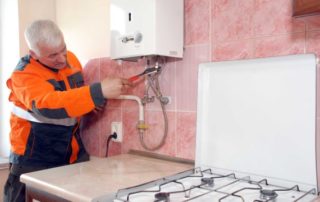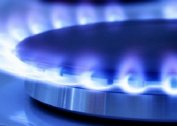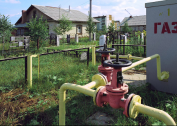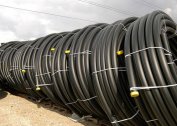Household gas is a combustible explosive mixture. Leaking it can lead to accidents, fires and deaths. If there are any signs of leakage - the smell of gas, a change in the color of the flame, you must immediately contact the emergency gas service.
Features and properties of domestic gas
The consumer is served with purified natural gas. 98% of the mixture is methane. It has no smell, no color, is flammable, weighs lighter than air, and when it accumulates to a critical value, it becomes explosive. These properties make blue fuel highly hazardous.
Since methane is light, it accumulates in the upper part of the room, closer to the ceiling. With a high ceiling height, the consumer may not notice this, even taking into account that the household gas mixture is enriched with special odorants.
Methane explosion is extremely powerful. Ignition of 10 liters of gas is equivalent to the explosion of 10 kg of TNT. Such a huge power is associated with the nature of the explosion. Gas detonation occurs according to the principle of a vacuum bomb: an oxygen-methane mixture burns out in an insignificantly short time, and literally 1 spark is required for ignition. In this case, a zone with very low pressure is formed in the combustion zone, because methane burns with the participation of oxygen. Air rushes to the center, an area with too high pressure is formed here, and air is directed to the periphery. So a shock wave of enormous power is formed.
Gas detonation is possible at a methane concentration of 5.3-14%. At higher contents, the likelihood of an explosion decreases, but the risk of fire increases sharply.
The first signs of a gas leak
The first obvious signal is the smell of gas. Methane itself does not smell, so special additives are added to it. They are safe, but their pungent unpleasant odor immediately attracts attention. However, in rooms with good ventilation, especially in the warm season, this symptom may be absent: the hood extracts light gas. This reduces the risk of explosion or fire, but it is more difficult to detect a leak.
Gas leaks in the apartment most dangerous. The rooms are small, especially the kitchen, where most gas appliances are located. In addition, only a small number of dwellings are equipped with forced exhaust ventilation. In its absence, methane accumulates rather quickly.
A gas leak is more often associated with damage to equipment such as a boiler, stove, or connecting elements. Pipes are much less likely to cause an emergency.
Smell of gas in the entrance does not always indicate the location of the leak. Methane can leak here from the apartment, from the street, from the basement or boiler room. Determining the source is difficult. If it smells of gas at the landing or at the entrance, you must call the emergency gas service.
If the smell in the entrance is strong, do not go down to the basement and test your hypothesis. This room is poorly ventilated. If a leak occurred here, the methane concentration will be much higher than in the stairwell. There is a high risk of poisoning or fire.
Causes of Gas Leaks
Leakage is possible due to professional errors in the installation of gas utilities or as a result of household accidents. The first include:
- manufacturing defects: defects in columns, flaws of burners and pipes;
- cracks and creases on the hose, poor fastening;
- material wear - if hose gaskets or gaskets on taps allow gas to flow through, it becomes dangerous to use the device;
- burner defects;
- damage to the gas cylinder.
This category also includes malfunctions arising from sloppy installation. With such breakdowns, it is not possible to establish the leak. The exception is a gas burner. If it is not mounted correctly, a yellow or red flame occurs.
For household accidents include:
- incomplete closing of the burner tap, resulting in a small permanent leak;
- flame attenuation in the gas device due to draft or air gusts;
- torch filling during cooking.
Household accidents are much more likely to cause accidents and poisoning than marriage or unprofessional installation.
Detection methods
Methane is not toxic and is considered physiologically harmless. It’s impossible to understand that a leak is occurring. The first signs of exposure - dizziness, dry mouth, increased heart rate - appear when its concentration in the air is 25-30%. However, methane forms an explosive mixture with oxygen much earlier - already at 5–6%.
There are special tricks to help simplify leak detection.
Approximately
Methane is colorless. Visually detect it in the air of the kitchen is impossible. However, a malfunctioning gas appliance can indeed be detected by eye. The normal color of the flame in the burner is blue. If flames of yellow or red color appear, this means that methane does not burn completely and the flame changes color due to the appearance of soot.
As a result, carbon dioxide, methane and carbon monoxide enter the air. The latter is much more toxic. If the burner lights up red, immediately turn off the device and call the gas men: the stove clearly needs to be cleaned.
If a suspicious whistle is heard in any area, the pipe or junction is lubricated with soapy water. When a leak appears soap bubbles.
Aurally
Although the pressure in the gas pipeline is minimal, the pressure in the room is even lower. You can find out what the leak is by the sound. When you turn on the stove or boiler, a whistle or hiss is heard.
By smell
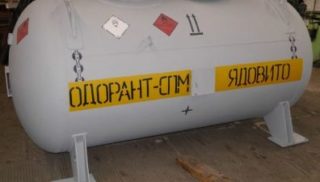
Since domestic gas leakage is extremely dangerous in order to facilitate its detection, odorants are added to natural gas. These are sulfur-containing substances with an extremely unpleasant pungent odor, which are found at an insignificant concentration.
In the countries of the former USSR, ethyl mercaptan is added to gas. Its main advantage: the specific smell of rotten cabbage or eggs is manifested when the initial liquid is diluted 1 million times. According to the standards, for every 1000 cubic meters of methane, 16 g of ethyl mercaptan is needed.
Ethyl mercaptan is a toxic substance, flammable, but its concentration in the gas mixture is extremely small and is not dangerous.
Leak Detection Actions
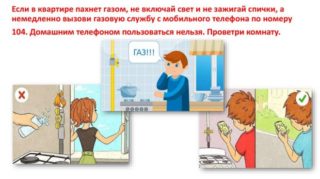 The duties of the gas service include the inspection and repair of gas pipe appliances and the prevention of accidents. To this end, service employees explain what to do if the apartment smells of gas, what actions should not be taken so as not to cause a fire or explosion.
The duties of the gas service include the inspection and repair of gas pipe appliances and the prevention of accidents. To this end, service employees explain what to do if the apartment smells of gas, what actions should not be taken so as not to cause a fire or explosion.
- If there is a smell of gas, the color of the flame has changed, a whistle is heard, you must immediately turn off all working gas appliances and turn off the methane supply tap.
- If the whistle appeared near the tap itself and the strongest smell is felt in the same place, cover this part of the pipe with a wet rag.
- If the gas escaping from the pipe ignites, you must not extinguish it. While it burns, there is no danger of an explosion. It is necessary to turn off the tap and open the windows.
- Open windows and doors immediately to create a strong draft. The faster methane erodes from the room, the lower the risk of fire. They open windows in the kitchen and in all other rooms.
- Do not use electrical appliances or turn on the light when a leak is detected. Turn off the power on the shield. This is the best way to prevent the occurrence of an accidental spark.
- It is strictly forbidden to use matches or a lighter in a gas-filled room and on the court.
- After turning off the devices, they call the emergency gas service - 104 or 04. It is recommended to call the firemen. You need to call the floor below, where the smell of gas is not felt. It’s best to do it outside.
- The leak must be warned by the neighbors. Do not ring the doorbell - you have to knock.
It is not uncommon for the smell of ethyl mercaptan to be confused with the smell of alcohol, ammonia, and others. According to statistics in Moscow last year, only 5% of the calls were substantiated.
For a false call punishment is provided - 1000-1500 p. a fine. The penalty is infrequently imposed only if calls follow the same address and for no apparent reason.
Safe use of gas equipment
A leak is easier to prevent than to eliminate its consequences. To do this, you must follow these rules:
- Only certified gas appliances are installed in an apartment or in a private house and only after consultation with a specialist.
- It is necessary to conclude a contract for the maintenance of gas appliances and ventilation. The agreement may be individual or general - in an apartment building, for example.
- Periodically, you should independently check the draft in the smoke and ventilation shafts, clean the chimney “pocket” from soot, observe the operation of the stove, boiler or air heater. In the absence of draft it is forbidden to use gas appliances.
- After use, the device is turned off and all the taps are closed. If gas is obtained from a gas cylinder, immediately shut off the valve and on it
- If they leave the house for a day, they shut off the gas valves in front of all devices except those that are designed for round-the-clock operation and are equipped with automatic safety devices. These devices are turned off if they leave the apartment for more than 3 days.
- The gas pipeline and equipment should be periodically inspected by a specialist. It is necessary to provide access to gas workers for inspection and repair.
- Do not disable safety automatics or other adjustment mechanisms.
- Do not make any changes to the design of gas appliances. It is forbidden to change the position of ventilation or smoke channels and gas appliances without prior approval.
It is the owner's responsibility to monitor the proper operation of gas equipment. It is necessary to ensure the possibility of gas services to conduct inspection. In case of violations in the operation of the stove or boiler, they immediately turn to specialists.
